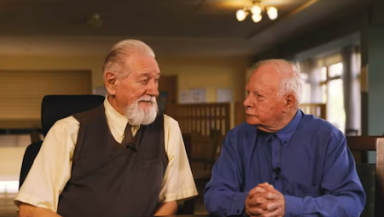
Alan and Eric, two residents at a Pilgrims' Friend Society home, share their experience of losing their wives.
"I thought my life was ending when my wife died. I loved her so much and she supported me all the way." Alan is in his eighties and lost his wife, Audrey, almost two years ago.
Eric, also in his eighties, is an avid gardener and is most proud of the rose tree he planted on his golden wedding anniversary. His wife and daughter passed away within weeks of each other last year.
Alan and Eric have become fast friends at the Pilgrims' Friend Society housing scheme that they both live in. The more people they meet, the more they realise how many are experiencing grief. And how few people are talking about it. That's why they're sharing their insights as part of a new film in the Getting Real about Getting Older series, Discussing Life after Loss.
"We've discovered people who lost their partner 10 years ago, some even longer, and have still never dealt with it," says Alan. "We made a list, when we both lost our wives, of all the comments that other people said to us. Some of them were okay but others were annoying. And I'm thinking back, did I ever say that to somebody?"
Alan and Eric found that there just isn't much out there by way of support for people who have lost someone. So both men started a group where people can come and talk about bereavement, grief and the whole range of emotions that go alongside it.
The group atmosphere allows people to feel free to open up and share some deep feelings – many times when there may be nowhere else to talk about it. They acknowledge that talking about it may be uncomfortable at first, but it is one of the most important steps in processing your grief.
Talking about it may sound simple, but Alan has seen first-hand the power of sharing. "Sometimes people are embarrassed about what they do after a person that was important to them dies. You know, like kissing a photograph of your partner every night, and they might feel silly doing this or doing that. But we found when we were talking to each other that we were doing the same thing – things that we previously found quite silly. It was a shared experience."
Eric says, "Of course, everyone's got to find their own way through bereavement. You don't know what loss means until you've walked through it. But it's something that we're experiencing and should be talking about."
Death stirs up visceral, painful emotions. It has a finality unlike anything else: we can't avoid it or reverse it. Talking about it brings up uncomfortable emotions – so we push it away. When it is discussed openly, we can look through death to the life Christ has won for us beyond. 1 Corinthians 15:55 says, "O death, where is your victory? O death, where is your sting?" When we talk about death in the light of the gospel the Holy Spirit brings comfort and hope.
Groups like Alan and Eric's enable people to process grief one small step at a time. Eric reminds us that this sometimes happens through seeing things from a different perspective.
"When my wife died I just stared at her empty chair, where she used to be. It made me sad. I thought about removing the chair, but just before I did, I thought, why not sit in the chair? Then it won't be empty. I sat down and realised that she had a perfect view out to the garden that I went out into every day – with our golden wedding anniversary tree right in the centre. She'd had a much better view than I'd ever had!"
You can watch the full conversation between Alan and Eric on the Pilgrims' Friend Society website, and access resources about ageing, grief and bereavement, like 'Coping with Grief and Loss" a special resource created by Pilgrims' Friend Society. To help people understand and cope with the challenges in their lives, this resource is written within a Christian context; author Louise Morse believes that without Christian spiritual insight, any help or understanding offered lacks vital, foundational truth. Reading how grief has affected others, physically and emotionally, normalises our own experience.













